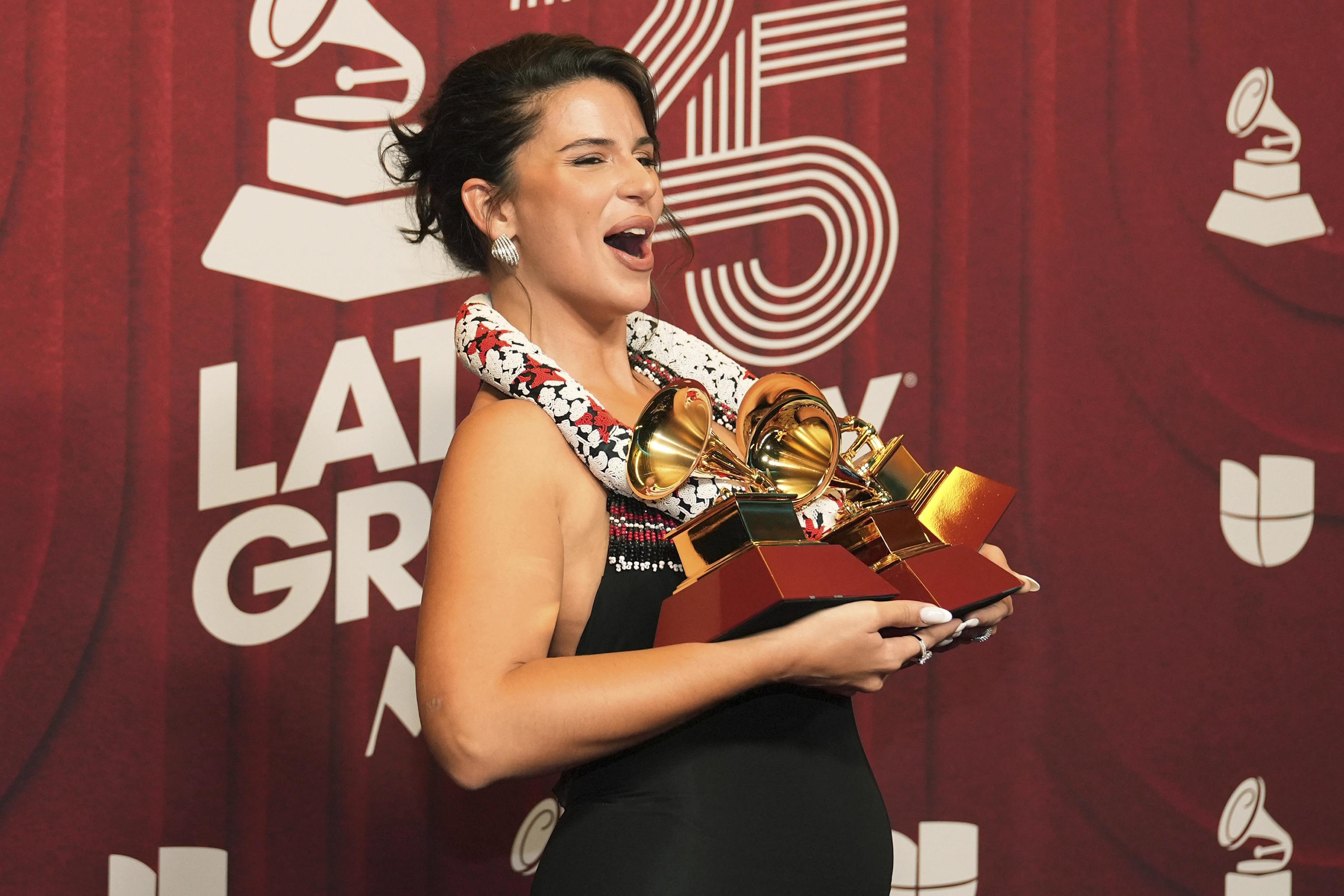Nathy Peluso has won three Latin Grammy Awards and has been one of the surprises of the ceremony held this Thursday in Miami, which has been disastrous for the Spanish nominees. Juan Luis Guerra has been the big winner of the 25th edition of the awards with four trophies, including Best Album and Best Record of the Year.
The Hispanic-Argentinian singer has been recognized with the award for Best Alternative Song for The Day I Lost My Youth, included in her album Grasa with collaboration from Devonté Hynes (Blood Orange). The song emerged one early morning, Peluso explained in her acceptance speech. "I had lost what moved me the most: my illusions and desires," she explained. "So I told myself, 'I have to recover myself.' And the best way to save ourselves is through music, making it and listening to it. For me, music has always been my path, my faith," she affirmed. So, she concluded, she decided to "write a prophecy and regain youth, innocence, and freedom."
Additionally, Nathy Peluso has won the award for Best Long Form Music Video, which she humorously thanked herself for in her speech: "Thanks to myself for getting me out of where I was and daring to do so much," she said.
To top it off, her song Learning to Love has received the award for Best Rap Song. A great achievement, as she competed against heavyweights like Bad Bunny, Eladio Carrión, Al2 El Aldeano, Vico C, and Akapellah.
Learning to Love is co-written by PabloPablo, the alias of Pablo Drexler, who is the son of Jorge Drexler, who also won two gramophones in one of the big surprises of the night, a half-surprise. The two minutes of his song Collapse have earned him one of the major awards of the night, the Best Song of the Year; in addition, he also received the award for Best Singer-Songwriter Song.
"This is crazy, I never thought I would win it," said this 60-year-old musician who learned to surprise everyone two decades ago when he won the Oscar for The Motorcycle Diaries. "The group of composers in which this little song was found is so incredible that I can only thank the Academy for removing my imposter syndrome," Drexler added. The veteran Uruguayan singer-songwriter residing in Madrid emotionally dedicated both awards to his father, who passed away 11 days ago, as he explained from the stage.
Spanish music had 15 nominations, but it was almost all disappointments except for Niña Pastori, who was awarded for her joint album with Lila Downs and Soledad Root I Never Left, which competed in the Best Folk Album category.
The singer from Cadiz dedicated the award to those affected by the DANA in Valencia: "I am happy, but I cannot forget the people from my land, especially Valencia, who have suffered greatly from the DANA. A big kiss to my people from Valencia, to all the people who have been attentive and fighting, we are a supportive country and this Latin Grammy is for them," she said from the stage.
In the Best Flamenco Album category, guitarist Antonio Rey (Tales of a Flamenco) prevailed over Vicente Amigo (Platforms of Time) and Las Migas (Rumberas). This is the second Latin Grammy that the Madrid guitarist has won.
The rest of the Spanish nominees had a disastrous outcome:
Quevedo lost in the Best Urban Song category to Beautiful by Daddy Yankee.
Iñigo Quintero could not win one of the major awards of the night, the Best New Artist, which was awarded to Colombian Ela Taubert.
Ale Acosta and Valeria Castro lost to Bzrp Session 53 by Bizarrap and Shakira in the Best Latin Electronic Music Performance category (for the Tiësto remix; the famous song already won last year's awards for Best Song of the Year and Best Pop Song).
David Bisbal lost in the Best Pop Song category to Holiday by Rawayana.
Rozalén, nominated in two categories, lost in the Best Singer-Songwriter Album category to Pause by Leonel García and in the Best Singer-Songwriter Song category to Collapse by Jorge Drexler, and García by Kany García, who shared the award.
C. Tangana faced a tough competition in the Best Short Form Music Video category and also did not win. The award went to another musician who has ventured into film direction, Residente, who won with 313, featuring Spanish artists Sílvia Pérez Cruz and actress Penélope Cruz.
Diego el Cigala lost to Kany García for Best Traditional Pop Vocal Album.
Mägo de Oz lost to Aterciopelados for Best Rock Album.
And neither Carlos Sadness nor Vetusta Morla won the Best Packaging Design award.
The Latin Grammy Awards return to the USA
After their visit to Seville last year, the Latin Grammy Awards have returned to the USA, specifically to the very Latin Miami, to celebrate their 25th edition.
The award ceremony for the Latin Grammy Awards takes place in the early hours of Thursday to Friday, Spanish time, between 2 a.m. and 5 a.m., but in that televised gala, only 10 of the 58 awards are announced, while a myriad of performances take place. The bulk of the awards were presented during a premiere held this afternoon, where most Spanish artists were vying for their chances.
Last year, the Spanish gala of the Latin Grammy Awards was very un-Spanish. Only Quevedo received awards for the Bzrp Session 52 by Argentine Bizarrap (best urban song), Niña Pastori in a category where only Spaniards were nominated, for the best flamenco album, and the unknown Marcos Vidal for the best Spanish-language Christian album; to them was added the Hispanic-Argentinian Nathy Peluso in the best music video category.
In 2023, Karol G and Shakira shared the spotlight at the Latin Grammy Awards, each winning three awards. Additionally, Bizarrap and Natalia Lafourcade also stood out, with three awards each, and Edgar Barrera was recognized as the best producer and composer of 2023.
